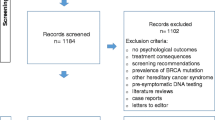Abstract
An increasing demand for genetic testing has moved the procedure from highly selected at-risk individuals, now also including cancer patients for treatment associated testing. The heritable fraction of ovarian cancer is more than 10 %, and our department has offered BRCA testing to such patients irrespective of family history since 2002. This study examined potential psychosocial distress associated with this procedure using The Multidimensional Impact of Cancer Risk Assessment (MICRA) questionnaire and other patient-rated generic distress instruments. Patients were divided into four groups according to cancer risk: mutation carriers, own history of breast cancer and ovarian cancer, family history of breast cancer and/or ovarian cancer, and patients without family history. In a postal survey, 354 patients responded. Good acceptance of the MICRA was observed, and previously described good psychometric properties were confirmed. A significant association between MICRA total score and receiving a positive BRCA test result was found. No significant between-group differences were observed with generic distress instruments. Time since cancer diagnosis, test result, and survey showed no significant associations with MICRA scores. Internal consistencies of instruments were adequate. Exploratory and confirmatory factor analyses showed adequate fit indices for a three factor solution of the MICRA, but further refinement of the items should be considered. In conclusion, the specific types of worry and distress most relevant to receiving genetic testing irrespective of family history were not captured by the generic distress instruments. The MICRA was supported as a useful tool for detection of mental distress related to genetic testing and risk evaluation.
Similar content being viewed by others
References
Antoniou A, Pharoah PD, Narod S, Risch HA, Eyfjord JE, Hopper JL et al (2003) Average risks of breast and ovarian cancer associated with BRCA1 or BRCA2 mutations detected in case series unselected for family history: a combined analysis of 22 studies. Am J Hum Genet 72:1117–1130
Chen S, Parmigiani G (2007) Meta-analysis of BRCA1 and BRCA2 penetrance. J Clin Oncol 25:1329–1333
Reichelt JG, Moller P, Heimdal K, Dahl AA (2008) Psychological and cancer-specific distress at 18 months post-testing in women with demonstrated BRCA1 mutations for hereditary breast/ovarian cancer. Fam Cancer 7:245–254
Hamilton JG, Lobel M, Moyer A (2009) Emotional distress following genetic testing for hereditary breast and ovarian cancer: a meta-analytic review. Health Psychol 28:510–518
Cella D, Hughes C, Peterman A, Chang CH, Peshkin BN, Schwartz MD et al (2002) A brief assessment of concerns associated with genetic testing for cancer: the multidimensional impact of cancer risk assessment (MICRA) questionnaire. Health Psychol 21:564–572
Lynch HT, Snyder C, Lynch JF, Karatoprakli P, Trowonou A, Metcalfe K et al (2006) Patient responses to the disclosure of BRCA mutation tests in hereditary breast-ovarian cancer families. Cancer Genet Cytogenet 165:91–97
O’Neill SC, Demarco T, Peshkin BN, Rogers S, Rispoli J, Brown K et al (2006) Tolerance for uncertainty and perceived risk among women receiving uninformative BRCA1/2 test results. Am J Med Genet C Semin Med Genet 142C:251–259
Tercyak KP, Peshkin BN, Brogan BM, Demarco T, Pennanen MF, Willey SC et al (2007) Quality of life after contralateral prophylactic mastectomy in newly diagnosed high-risk breast cancer patients who underwent BRCA1/2 gene testing. J Clin Oncol 25:285–291
Rini C, O’Neill SC, Valdimarsdottir H, Goldsmith RE, Jandorf L, Brown K et al (2009) Cognitive and emotional factors predicting decisional conflict among high-risk breast cancer survivors who receive uninformative BRCA1/2 results. Health Psychol 28:569–578
O’Neill SC, Rini C, Goldsmith RE, Valdimarsdottir H, Cohen LH, Schwartz MD (2009) Distress among women receiving uninformative BRCA1/2 results: 12-month outcomes. Psychooncology 18:1088–1096
Graves KD, Gatammah R, Peshkin BN, Krieger A, Gell C, Valdimarsdottir HB et al (2011) BRCA1/2 genetic testing uptake and psychosocial outcomes in men. Fam Cancer 10:213–223
Halbert CH, Stopfer JE, McDonald J, Weathers B, Collier A, Troxel AB et al (2011) Long-term reactions to genetic testing for BRCA1 and BRCA2 mutations: does time heal women’s concerns? J Clin Oncol 29:4302–4306
Graves KD, Vegella P, Poggi EA, Peshkin BN, Tong A, Isaacs C et al (2012) Long-term psychosocial outcomes of BRCA1/BRCA2 testing: differences across affected status and risk-reducing surgery choice. Cancer Epidemiol Biomarkers Prev 21:445–455
Zigmond AS, Snaith RP (1983) The hospital anxiety and depression scale. Acta Psychiatr Scand 67:361–370
Bjelland I, Dahl AA, Haug TT, Neckelmann D (2002) The validity of the hospital anxiety and depression scale. An updated literature review. J Psychosom Res 52:69–77
Horowitz MJ, Wilner N, Alvarez W (1979) Impact of event scale: a measure of subjective distress. Psychosom Med 41:209–218
Read CY, Perry DJ, Duffy ME (2005) Design and psychometric evaluation of the psychological adaptation to genetic information scale. J Nurs Scholarsh 37:203–208
Phelps C, Bennett P, Jones H, Hood K, Brain K, Murray A (2010) The development of a cancer genetic-specific measure of coping: the GRACE. Psychooncology 19:847–854
Eijzenga W, Bleiker EM, Hahn DE, Kluijt I, Sidharta GN, Gundy C et al (2014) Psychosocial aspects of hereditary cancer (PAHC) questionnaire: development and testing of a screening questionnaire for use in clinical cancer genetics. Psychooncology 23:862–869
Eijzenga W, Aaronson NK, Kluijt I, Sidharta GN, Hahn DE, Ausems MG et al (2014) The efficacy of a standardized questionnaire in facilitating personalized communication about problems encountered in cancer genetic counseling: design of a randomized controlled trial. BMC Cancer 14:26
Acknowledgments
Alv A. Dahl, MD, PhD holds a grant from The Norwegian Radium Hospital Foundation. This work was supported by the Inger and John Fredriksen Foundation for Ovarian Cancer Research.
Conflict of interest
The authors declare no conflict of interest.
Ethical standard
The study protocol was approved by The Institutional Review Board and The Regional Committee for Medicine and Health Research Ethics of South-East Norway. All patients gave written informed consent when they returned the questionnaire.
Author information
Authors and Affiliations
Corresponding author
Rights and permissions
About this article
Cite this article
Bjørnslett, M., Dahl, A.A., Sørebø, Ø. et al. Psychological distress related to BRCA testing in ovarian cancer patients. Familial Cancer 14, 495–504 (2015). https://doi.org/10.1007/s10689-015-9811-2
Published:
Issue Date:
DOI: https://doi.org/10.1007/s10689-015-9811-2




